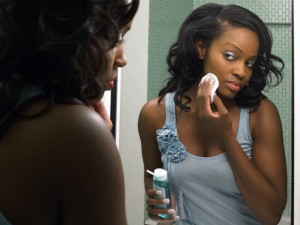(ThySistas.com) From cleansers to serums to night creams, the beauty aisle is lined with many complexion-enhancing products. And while each one serves a special purpose, here are four key tips what everybody’s skin needs every day, why those elements are so important, where you’ll find them, and which supposed “necessities” might really be harming your complexion.
1. Water
The human body is full of water — it’s 55 percent to 75 percent of what we are. Water flushes toxins out of the body, allows our cells to absorb nutrients, and keeps our digestive processes moving smoothly.
But that water isn’t a constant. The most basic bodily processes, like breathing and sweating, remove that water from our cells. So for our cells to function properly, we need to consume lots of water to replace what we lose.
The skin is no different from the rest of the body when it comes to needing hydration. Water helps to remove impurities from the skin that can lead to pimples, and it hydrates to keep the skin looking plump and smooth.
To keep the skin hydrated, you should drink at least half a gallon (2 liters) of water each day.
2. Cleansing
Cleansing is the most basic element of any skin-care routine. It not only removes excess dirt, pollutants and pore-clogging oil from the epidermis so it can remain blemish-free, but it also preps the skin for any subsequent products you’ll be using, so active ingredients (like vitamins or sunscreen) can penetrate and be most effective.
can penetrate and be most effective.
But not all cleansers are the same. First, a facial cleanser should always be soap-free; the soap products you use on the rest of your body are typically too harsh for the face. And, as with most skin-care products, you need to pick one that suits your skin type. For very dry skin, you might want to go with a creamy cleanser. Dry and/or sensitive skin should always go alcohol-free, whether creamy or not. An oily epidermis can benefit from an acidic cleanser, like an alpha-hydroxy product, which does a better job of breaking up sebum — the skin’s oily secretion that can lead to clogged pores.
Whichever cleanser is right for you, be sure to massage it into your face for at least 20 seconds so it has a chance to do its job.
3. Essential Fatty Acids
Essential fatty acids, or EFAs, are an important component of any healthy diet. They help to build up the lipid-based cell membranes that hold in water and nutrients. In the case of the skin, those lipids also form an oil barrier that protects the skin from UV damage and pollutants.
Without EFAs, skin-cell membranes and that overall protective barrier can’t work effectively. The skin ends up overly exposed, dehydrated and prone to produce a more harmful type of sebum, leaving it dry, inflamed and blemished.
The EFAs you need to keep your skin looking great are primarily omega-3 and omega-6 fatty acids. Omega-6 is found in tons of foods, including poultry, grains and cooking oils, so you’re probably getting plenty of that. Omega-3s are somewhat harder to come by; you’ll find those in cold-water fish, like salmon and sardines, along with flaxseed and safflower oils, kidney beans, walnuts and spinach. Some skin experts also recommend another EFA, gamma linolenic acid (GLA), for its anti-inflammatory effects. GLA is founds mostly in plant oils.
You might find it helpful to take an omega-3 or GLA supplement to improve your skin health. You’ll find those in most grocery stores, and definitely any natural-foods store.
4. Antioxidants
Antioxidants are widely believed to be beneficial for both cardiovascular health and cancer prevention. They’re found in all sorts of foods, including fruits, vegetables, seafood and oils. Antioxidants’ free-radical-fighting activities destroy molecules that can damage healthy cells, and as it turns out, they’re as great for skin cells as they are for every other cell in the body.
While many different antioxidants can be beneficial to the skin, two in particular get lots of attention:
Vitamin C — Builds collagen for plump, tight skin. Find it in whole grains, apples and citrus fruits. Aim for 75 milligrams a day.
Vitamin E — Protects cell membranes and “boosts” skin-based nutrients that fight off UV damage. Find it in wheat germ oil, almonds, and peanut butter. Aim for 15 milligrams a day.
Other skin-beautifying antioxidants include selenium, thiamine, beta-carotene and zinc.
Written By Brittany Gatson










Leave a Reply